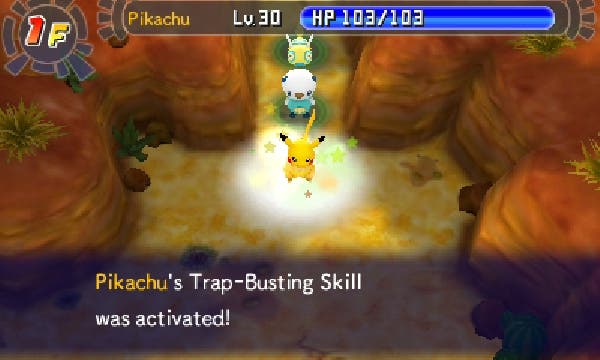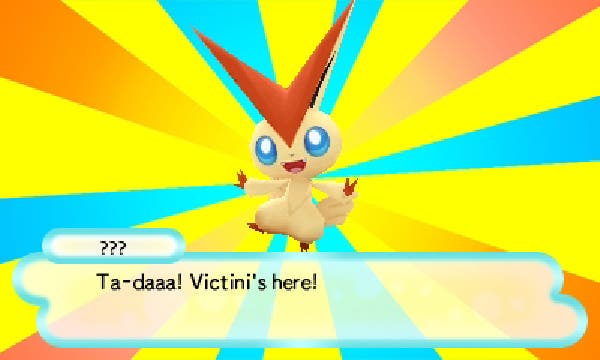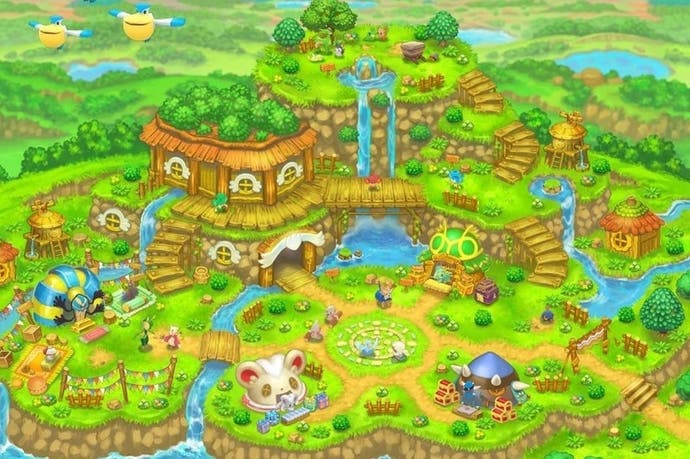Pok¨¦mon Mystery Dungeon: Gates to Infinity review
Tyrogue-like.
It's no great surprise that the Pokémon are, traditionally, speechless creatures. The series aims to recreate the sense of joy that its creator Satoshi Tajiri experienced during lingering childhood summer holidays when he would head from his family home on the outskirts of Tokyo to search the surrounding undergrowth in search of mini-beasts, cataloguing each one he caught in a notepad bought for him by his parents. The joyful sense of disciplined collection and classification Tajiri hoped to conjure in his game would dissipate if the monsters could talk.
Less generously, this is also a game series in which teenagers injure small animals till they're too weak to resist capture, before fighting them against one another in a Saturday morning cartoon approximation of cock fighting. Small wonder Nintendo neglected to gift the Pokémon language. Their cries for emancipation would surely echo loud around every corner of Unova.
Pokémon Mystery Dungeon: Gates to Infinity, the first 3DS title in Chunsoft's line of rogue-like spin-offs to the series, bucks the trend by casting the player as a Pokémon trainer who has been turned into one of the diminutive creatures and, as a result, speaks fluent Pikachu. The game's writers have grasped the opportunity offered by the premise with both paws, delivering great swathes of un-skippable dialogue. This has the mild benefit of making us party to the rather asinine thoughts and motivations of the Pokémon cast, but it does so at the expense of pacing and accessibility.

While the game shies away from letting us into whether the Pokémon view their trainers as benevolent carers or cruel slave masters (approaching such rich thematic matter would, of course, never be allowed), your broad task in the game is to plot and build a safe commune for these creatures live within. The furry utopia project is the brainchild of the first wet-nosed Pokémon you encounter after you fall to earth (the breed of which you must select from five options, along with that of the Pokémon you turn into.) In order to build and furnish the commune you must head into the eponymous Mystery Dungeons that have recently sprung up in the locale in search of aid and resources.
Once inside a mystery dungeon, the game presents a straightforward, somewhat bland take on the ancient rogue-like - a style of game named after the seminal 1980 ASCII computer game, Rogue. The environment - which is multi-floored, randomly generated and changes every time you exit and re-enter the dungeon - is divided into invisible squares like a chessboard. Every time you move your Pokémon onto an adjacent square or, alternatively, execute an attack, all of the other monsters in the dungeon simultaneously take a single move. The game then effectively pauses as you decide whether to take another step or, if you're facing up against an enemy, how you wish to act.
As the game is set within the Pokémon universe, each of your character's four basic moves has a limited number of uses before they are depleted and can no longer be executed. This introduces some mild strategy as you consider whether to save up your more powerful attacks for potentially stronger foes deeper into the dungeon, or whether to use them as often as possible in order to level up their potency and usefulness. You may, of course, replenish your moves with a restorative item at any point or, better still, stand on one of the randomly spawning blue squares that will fully restock your abilities.
At the start of the game you're joined by your companion Pokémon, but soon you find others who are recruited to your cause. Eventually you'll be trailed by three supporting Pokémon on each expedition. While there's some basic strategy to how you arrange your team, their movements and attack choices are decided by the somewhat trigger-happy AI, which routinely uses the most powerful attacks on even the least-threatening enemy who's cowering in some dingy corner of the dungeon. This lack of control can frustrate, especially when you prick against one of the game's infrequent difficulty spikes.

Players familiar with rogue-likes will accept the featureless, tunnelled environments that new players may find harder to pick through, but they will also baulk at the lack of jeopardy and complexity here. Rogue-likes are at their best when they inspire grim trepidation, where each new step is another potential lurch into a perilous trap, and where poor planning and unscrupulous resource management leads, not to a happy emergence into the fresh breeze, but to a certain demise. Even in the latter stages of the game the peril has been muted to the point of tedium - particularly as you can use your companions as shields to protect your own health bar. Arguments that Pokémon games are for young children and should be straightforward fail, as every title in the mainline series matches its accessibility with latter depths and opportunities for showboating mastery.
As you work deeper into each dungeon you collect loot and items, which are either used to complete mandatory or optional quests dispensed by other Pokémon back on the surface. Many of these items are used as raw materials for clearing land and building new facilities in the Pokémon commune and seeing your town grow and develop is the core motivation to press through each new dungeon and the thick stack of dialogue screens that bookend each. The optional quests that speed the town's expansion are far shorter than the main story missions, and benefit from this brevity and clarity.
Further spark and interest is provided by the game's creative Magnagate AR feature, which will 'convert' certain objects and shapes photographed with the 3DS camera into new dungeons, ones that generally offer a greater challenge and improved loot. In these areas the game demonstrates the development team's energy and creative commitment to its work. But despite these inventions, the abiding sense is of a lack of variety and a game that fails to fully express its best ideas. Perhaps that's a self-imposed restriction derived from trying to marry two game styles that enjoy limited compatibility, or maybe of trying to serve an audience that's too broad and divided to do so with coherent success. Regardless, few will stick around to the end in order to hear what little the Pokémon have to say about it all.

